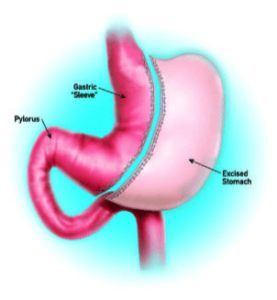Vertical sleeve gastrectomy (VSG), also known as gastric sleeve surgery, is a popular and effective bariatric surgery that helps patients lose weight safely and successfully. Respected Dallas weight loss surgeon Dr. Preeti Malladi has performed these surgeries for many years and has the knowledge, experience, and skills to help patients return to good health by overcoming obesity.
What Is Sleeve Gastrectomy Surgery?
In a gastric sleeve surgery, a portion of the stomach is removed, leaving a small sleeve-like section behind. This sleeve holds much less food than before surgery and thus helps you eat less and consume fewer calories.

How it Works
The VSG procedure is performed by a bariatric surgeon and is typically a minimally invasive laparoscopic or robotic surgery done under general anesthesia. The surgeon uses a laparoscope (a small camera) to see inside the abdomen and specialized instruments to perform the weight loss surgery. Five or six small incisions are made to accommodate the camera and the instruments. This technique is of great benefit to weight loss surgery patients because they avoid the larger incisions and longer healing process of open surgery.
The doctor removes about three-fourths of the patient’s stomach, leaving a tube or gastric sleeve behind. The digestive tract is not rerouted as in the gastric bypass surgery. The smaller sleeve-like section holds much less food so the patient must eat less. The removal of a large part of the stomach means the body produces less of the hormone that produces a feeling of hunger.
What Are the Benefits of a Sleeve Gastrectomy?
The VSG procedure is typically performed on both lower BMI patients and high BMI patients. The minimally invasive sleeve procedure can be performed in less time than gastric bypass but produces somewhat slower weight loss.
The primary benefit is that you can eat less and still feel satisfied. Just as with any weight loss surgery, VSG does not replace diet and exercise. But it is a critically important tool to use in combination with them to regain control of your health. When the gastric sleeve procedure is combined with these other important lifestyle changes, most surgery patients can expect significant weight loss within the first year.

Am I a Candidate for Gastric Sleeve Surgery?
If you are considering this operation, it is important to talk to a trusted bariatric surgeon. If you are more than 100 pounds overweight, have a BMI above 35 (and even some with a BMI over 30), or have a chronic condition related to your weight, you are likely a candidate for sleeve gastrectomy. Plano and Dallas bariatric surgeon Dr. Preeti Malladi can discuss bariatric surgery with you and determine whether you are a candidate for VSG.
How Long Does It Take to Recover from Gastric Sleeve Surgery?
There is no set length of time for a hospital stay after VSG. Following your gastric sleeve surgery, you will be asked to stay in the hospital for one night and possibly more if needed. After you leave the hospital, recovery time will vary by individual. The time you need to recover before you can return to work can be quite different for each patient. It’s not uncommon for some people to experience low energy initially, but typical energy levels normally return within the first two weeks or less.
Many patients, eager to resume their normal life and get back to work after bariatric surgery, may be eager to shorten the total recovery time that is needed after gastric sleeve surgery. But it’s important not to cut your recovery time short.
Many bariatric surgeons recommend that most patients should plan on spending about one to two weeks away from work for the full recovery process after undergoing bariatric surgery. This full recovery period is crucial as it allows the body to heal and adapt to the new changes, including the healing of the incision sites. You will be restricted from strenuous activities and any heavy lifting for the first several weeks after surgery.
During this recovery process, it’s encouraged to reintroduce light physical activity into your routine, as advised by your healthcare provider. However, any strenuous activity should be avoided until you’re fully recovered.
The journey to work after weight loss surgery can be challenging, but with the right guidance and patience, it’s entirely achievable. Remember, every individual’s recovery journey is unique, so it’s important to listen to your body and not rush the process.
Does Insurance Cover Vertical Sleeve Gastrectomy?
Yes, many insurance plans cover the gastric sleeve if it is deemed medically necessary and the insurance criteria are met. Every insurance policy is different, so please contact your insurance provider to discuss your coverage. Dr. Malladi’s office can also help inquire about your insurance coverage and criteria.
Gastric Sleeve Recovery
After surgery, you can expect a hospital stay of one day. There will be some abdominal swelling and your pain will be controlled with pain medication. Before you leave the hospital, you will receive instructions on how to take care of your incisions, and any restrictions on your activity. You will probably be restricted from heavy lifting for at least four to six weeks. During your recovery, it will be your job to get up and move around several times every day to avoid developing blood clots in your legs. You should plan on taking at least one to two weeks to let your body heal before resuming high levels of activity.
After your weight loss surgery, you will be on a liquid diet for two weeks. After that, you will transition to soft foods for four weeks. It is very important for your long-term success that you follow your bariatric surgeon’s post-op dietary instructions at home. Failing to do so could damage your VSG and jeopardize your recovery.

What Can I Expect After Surgery?
Once you are cleared for exercise by your doctor, you should start exercising regularly. This can be walking, biking, swimming, or any other type of exercise that you enjoy. If you exercise regularly and follow a sensible, high-protein diet, you’ll find that you should expect to lose 50-70% of your excess weight in 24 months. Be careful about what you eat and drink as you will get full quickly. Do not overfill your stomach. Follow a low-fat, low-sugar diet and limit starchy foods.
You will need to take supplements on a daily basis according to your doctor’s instructions to replace nutrients you need that you may not be getting from your diet. You should also avoid alcoholic beverages, aspirin, ibuprofen, and NAIDs as you are at increased risk for an ulcer and these substances are hard on the gut. Stick with acetaminophen for pain relief. We also recommend avoiding carbonated beverages as the excess gas can be unpleasant for weight loss surgery patients.
If you would like to learn more about bariatric surgery and discuss how a laparoscopic gastric sleeve might fit into your health plan, contact Dr. Malladi to schedule an appointment in either Dallas or Plano.



